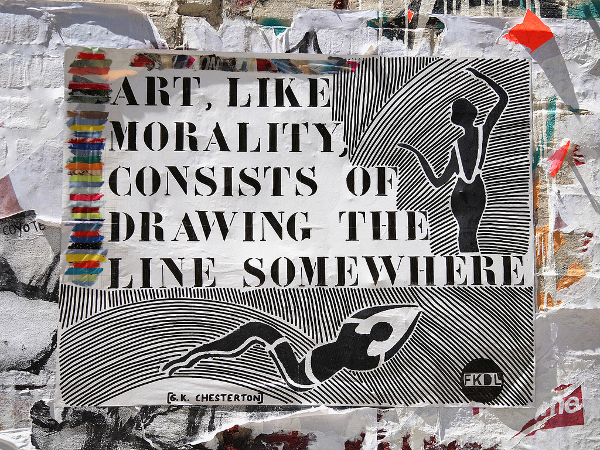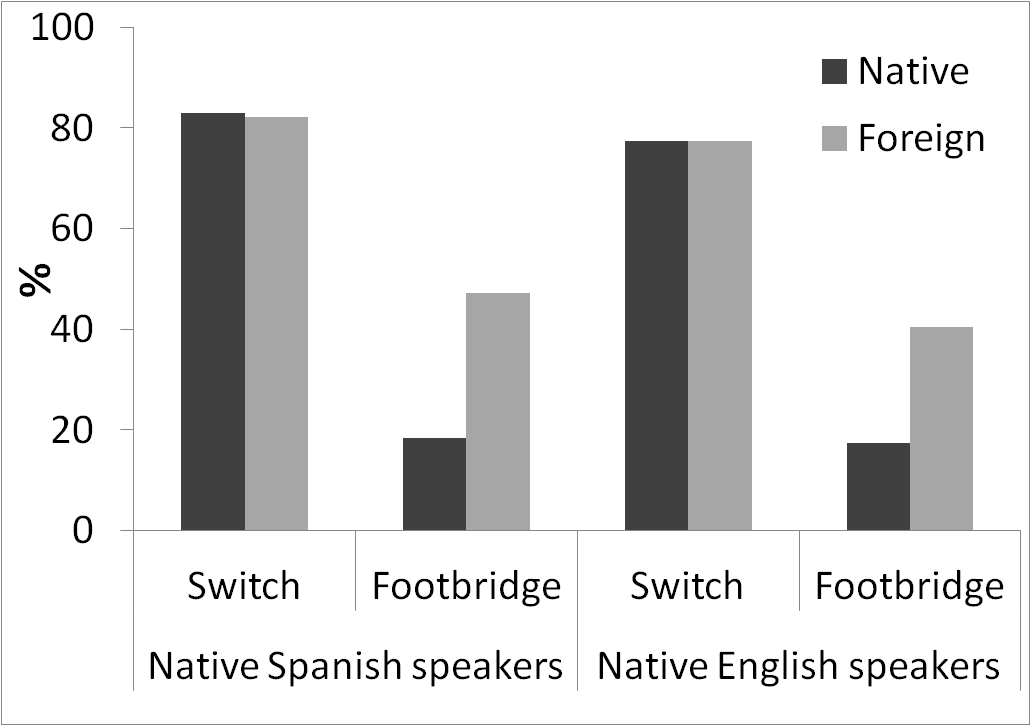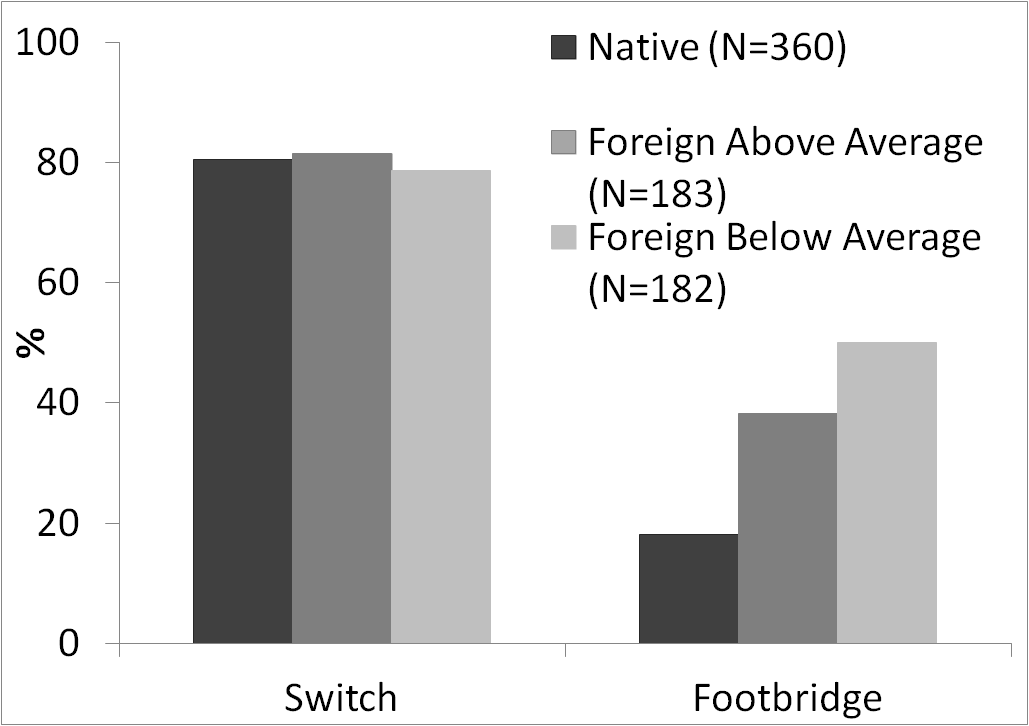Joanna D. Corey & Albert Costa
Center for Brain and Cognition, Universitat Pompeu Fabra, España

(cc) Gareth.
It may seem reasonable to think that our moral decisions (and selves) do not depend on which language we are using (native or foreign). However, recent evidence suggests that the language in which decision information is presented affects subsequent choices. The use of a foreign language, compared to a native one, leads to an increase in utilitarian choices in particularly difficult or emotional decisions. Possible mechanisms are discussed.
Would you sacrifice one life to save five? We may like to think that our response, and our most important choices in general, should not be affected by what language we are using (native or foreign). As long as one understands the content of the decision, language should not have an effect since morality is conceived as occurring at a deeper conceptual level. However, it appears that indeed, the language of use influences moral decisions (Costa et al., 2014; Cipolletti, McFarlane & Weissglass, 2015; Geipel, Hadjichristidis & Surian, 2015).
Whether people make the utilitarian decision (preferring to maximize overall welfare) or the deontological one (choosing to adhere to moral rules, i.e., do not kill), depends largely on the details of the context. A large body of research on moral decision-making has presented two versions of a dilemma to participants. In both dilemmas there is a runaway train that will kill five people unless another person is sacrificed (see Figures 1 and 2). In the Switch version (Foot, 1978), this can be accomplished by using a lever to switch the train track such that the train only kills one person. So the utilitarian decision requires an ostensibly inoffensive action, and the death of the one is collateral damage.

Figure 1.- The Switch Dilemma. (cc) David Navarrot.
On the other hand, in the Footbridge version (Thomson, 1985), the five can be saved by pushing a very fat man off a bridge, using his body to stop the train. Here the utilitarian option requires a typically harmful action that involves personal physical contact, and this death is instrumental. Prior research has shown that people mostly make utilitarian choices in response to the Switch problem. However, when presented with the Footbridge version, most people make the deontological choice despite the options being the same.

Figure 2.- The Footbridge Dilemma. (cc) David Navarrot.
Costa et al. (2014, Experiment 1) presented participants in four different countries with the Footbridge problem in various native and foreign languages. They found that those using a foreign language gave significantly more utilitarian responses than those using a native one (with the only exception being East Asians, which is consistent with previous findings; Gold, Colman & Pulford, 2014). In Experiment 2, the participants were given both Switch and Footbridge dilemmas in a native or foreign language. Crucially, there were two samples: one had English as a native language and Spanish as a foreign one, and the other had the inverse pattern of languages. The results replicated the effect of language on responses to Footbridge, but found no effect of language for Switch (Figure 3).

Figure 3.- Percentage of utilitarian decisions for Switch and Footbridge made by each of four language groups (Experiment 2 of Costa et al., 2014): native Spanish speakers using Spanish (N = 200) and English (N = 197); and native English speakers using English (N = 160) and Spanish (N = 168).
Cipolletti et al. (2015) and Geipel et al. (2015) replicated these findings. These results reveal that the use of a foreign language leads to increased utilitarianism for particularly conflicting or emotional decisions. The lack of an effect of language on responses to Switch also indicates that the effect for Footbridge is not due to random responding by those using a foreign language. In addition, these findings from diverse and complementary populations allow us to exclude the possibility that the effect is limited to people from certain cultures or with certain native languages. However, the effect of language appears to be moderated by foreign language proficiency (Figure 4).

Figure 4. Percentage of utilitarian decisions for Switch and Footbridge, with those of the foreign language group split by proficiency (Experiment 2 of Costa et al., 2014).
There are multiple explanations for the use of a foreign language increasing utilitarian decisions. When using a foreign language, processing is more controlled, deliberate, and requires more time. Also, automatic processes, such as emotional reactions, appear to be less active in this context. Similarly, there is support for the idea that people experience foreign language content as more psychologically distant.
According to dual models of cognition (e.g., Kahneman, 2011), System 1 processes are automatic, intuitive and affective, and System 2 processes are controlled, analytical, rational and require more time. When using a foreign language, it seems System 1 is dampened and System 2 is more engaged, which would heighten the latter’s influence on decisions. According to a dual model of moral decision-making (see Greene, Nystrom, Engell, Darley, & Cohen, 2004), System 1 processes support deontological decisions whereas System 2 processes drive utilitarian ones. This is because empathy and harm aversion (automatic, emotional processes) are most likely what drive deontological tendencies, whereas deliberate cost-benefit-analyses lead to utilitarian tendencies. For example, inebriation decreases System 1 processes and leads to increased utilitarian choices in Footbridge (Duke & Bègue, 2015). Furthermore, fMRI evidence shows that there is more activation in brain areas supporting abstract reasoning and cognitive control when a person makes a utilitarian judgment compared to a deontological one (see Greene et al., 2004). Thus, the different weighting of influences from these two systems in a foreign language could drive increased utilitarian tendencies. Similarly, psychological distance would promote the same effect, by enhancing processes such as focusing on the ends and not the means: Inducing psychological distance or a more abstract mindset leads to increased utilitarian responses in moral dilemmas (Aguilar, Brussino & Fernández-Dols, 2013).
While the definitive driving mechanism behind the foreign language effect has yet to be determined, the direction of its influence is clear. When processing information in a foreign language, people’s moral decisions appear to be more based on the consequences than the details of the action or context.
References
Aguilar, P., Brussino, S., & Fernández-Dols, J. M. (2013). Psychological distance increases uncompromising consequentialism. Journal of Experimental Social Psychology, 49, 449-452.
Cipolletti, H., McFarlane, S., & Weissglass, C. (in press, 2015). The Moral Foreign-Language Effect. Philosophical Psychology.
Costa, A., Foucart, A., Hayakawa, S., Aparici, M., Apesteguia, J., Heafner, J., & Keysar, B. (2014). Your morals depend on language. PLoS ONE, 9(4), e94842.
Duke, A. A., & Bègue, L. (2015). The drunk utilitarian: Blood alcohol concentration predicts utilitarian responses in moral dilemmas. Cognition, 134, 121-127.
Foot, P. (1978). The problem of abortion and the doctrine of the double effect. In: Foot, P. Virtues and Vices and Other Essays in Moral Philosophy (pp. 19-32). Oxford: Blackwell.
Geipel, J., Hadjichristidis, C., & Surian, L. (2015). The foreign language effect on moral judgment: The role of emotions and norms. PloS ONE, 10(7), e0131529.
Gold, N., Colman, A. M., & Pulford, B. D. (2014). Cultural differences in responses to real-life and hypothetical trolley problems. Judgment and Decision Making, 9, 65-76.
Greene, J. D., Nystrom, L. E., Engell, A. D., Darley, J. M., & Cohen, J. D. (2004). The neural bases of cognitive conflict and control in moral judgment. Neuron, 44, 389-400.
Kahneman, D. (2011). Thinking, Fast and Slow. New York, NY: Macmillan.
Thomson, J. J. (1985). Double effect, triple effect and the trolley problem: Squaring the circle in looping cases. Yale Law Journal, 94, 1395-1415.
Manuscript received on June 15th, 2015.
Accepted on August 31st, 2015.
This is the English version of
Corey, J. D., y Costa, A. (2015). El efecto de usar una lengua extranjera sobre las decisiones morales. Ciencia Cognitiva, 9:3, 53-56.

